On Tuesday 27th September at the European Parliament in Strasbourg MEPs voted on and adopted a resolution regarding a report – European road safety 2011-2020 prepared and submitted by German MEP Dieter-Lebrecht Koch from the MEP Committee on Transport and Tourism (Tran).
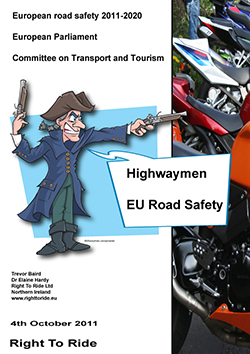 On Tuesday 27th September at the European Parliament in Strasbourg, MEPs voted on and adopted a resolution regarding a report – European road safety 2011-2020.
On Tuesday 27th September at the European Parliament in Strasbourg, MEPs voted on and adopted a resolution regarding a report – European road safety 2011-2020.
Prepared and presented by German MEP Dieter-Lebrecht Koch from the MEP Committee on Transport and Tourism (Tran) the report is non-legislative, so is not a proposed regulation or a directive but suggestions for future action.
The main target of the report, “Wholeheartedly endorses the objective of halving by 2020 the total number of road deaths in the EU by comparison with 2010”. The previous, “Third Road Safety Action Program of the European Commission” expired in 2010 and did not meet its goals to reduce road deaths by half. The Koch report calls for further clear and measurable targets to be set for the same period (2011 -2020).
The report highlights for the ordinary motorcyclists what the thoughts of the European Parliament and the MEPs elected by citizens think and would like to see regarding road safety. Though bear in mind that although this report has been accepted by the European Parliament, not all MEPs agree with all of the content.
Contained in the report is a list of road safety recommendations and calls to the European Member States but more importantly to the European Commission to enact the report’s recommendations.
However taking the context of road safety into the real world of a dire economic climate what these recommendations and calls are asking for, is that member states and their agencies spend and focus their budgets on road safety. The report “Regrets that the EU budget for road safety measures has been cut significantly in recent years and calls on the Commission to reverse this trend.”
While certainly there is a priority to reduce road safety casualties, which in turn reduces costs to member states, will these be seen as an investment on cost versus benefit?
For Motorcycling
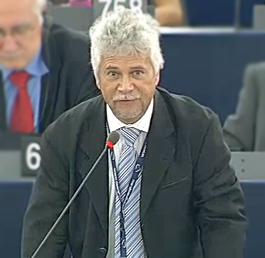 The report contains specific recommendations and considerations for the safety of motorcyclist which include:
The report contains specific recommendations and considerations for the safety of motorcyclist which include:
- Considers that, in car driving lessons, greater attention should be devoted to the phenomenon of motorised two-wheeled vehicles and their visibility.
- Urges the Commission and Member States to call on their national, regional and local authorities to design their roads in such a way that they do not present any hazards to motorised two-wheeled vehicles; points out that the standard guard rails used on European roads are a death trap for motorcyclists.
- Calls on the Member States to take prompt action (including replacing the existing guard rails) to refit dangerous stretches of road with rails with upper and lower elements as well as with other alternative road barrier systems, in accordance with Standard EN 1317, in order to lessen the repercussions of accidents for all road users;
- Draws attention to the danger posed to motorcyclists by tarmac patches, which offer much less grip than the normal asphalt road surfaces;
- Calls on Members States and road operators to provide appropriately designed facilities to improve safety which are all well equipped with road signs and well lit, and thus more user-friendly, especially for motorcyclists and cyclists;
However there are further recommendations and considerations where we start to have concerns because these can be open to interpretation of what is considered good for motorcycling. As we have said before, the devil is in the detail and we don’t know what those details may include.
- Welcomes the Commission’s stated aim of paying special attention to the safety of motorcyclists;
- Regards the phased, mandatory introduction of anti-brake-locking systems on all new motorcycles as an important measure which could substantially reduce the number of serious motorcycle accidents;
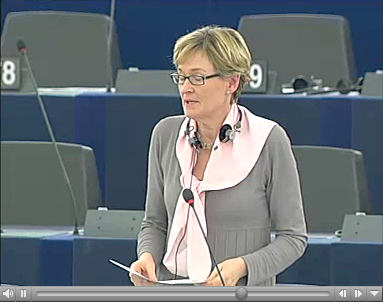 During the debate in the Europe Parliament the Irish MEP, Mairead McGuinness (PPE) addressed parliament and stated “It is interesting that we are debating it (the report) following the protests over the weekend by European Union motorcyclists. Many came out in protest – certainly in Ireland and in other Member States – over what we would describe as positive initiatives regarding road safety for that particular sector of the commuting community.
During the debate in the Europe Parliament the Irish MEP, Mairead McGuinness (PPE) addressed parliament and stated “It is interesting that we are debating it (the report) following the protests over the weekend by European Union motorcyclists. Many came out in protest – certainly in Ireland and in other Member States – over what we would describe as positive initiatives regarding road safety for that particular sector of the commuting community.
It is interesting to note that, in Ireland, a motorcyclist is 12 times more likely to be killed than any other road user. There is clearly a problem in relation to the safety of this section of road users. I think we should try to work better with stakeholders, so that we do not have protests over something which we believe is important for overall road safety. Some of the issues that were raised by the protestors may not be true, but we can address others when we move forward. Let us involve those that we are trying to legislate for.”
Full speech link to video – opens in new window – Click Here
The Bad
While there are positive recommendations for motorcycling and riders, there is one call that sticks out like a sore thumb, which is:
- Calls for the introduction of monitoring equipment by means of which speeding offences by motorcyclists can be systematically detected and punished;
At Right To Ride EU, our main concern, to put it mildly, is that we find it outrageous that this point was allowed to be presented, never mind adopted in the report.
We have written to the MEP in charge of the report from the Committee on Transport and Tourism, German MEP Dieter-Lebrecht Koch.
Reading through the amendments to the report, two MEPS from the Committee on Transport and Tourism submitted amendments to include, “and other road users” in the text and another to delete the text all together. It seems to us that the rest of the MEPs who did not vote for these amendments are being led by a misinformed attitude towards motorcyclists.
This became clear in the debate in the European Parliament when German MEP Thomas Ulmer (PPE), submitted a statement in writing, “Cynically I might note that we could reduce the number of road deaths fastest if we ban all two-wheelers now.” However he did reject the report, “not, because I would be against the road traffic safety, but because the measures proposed in this report to a large extent, significantly erode civil liberties. They go far beyond the level of recommendations and some are from the reprisals catalogue like a dictatorship.” Overall he also stated, “But precisely because such proposals strongly restrict the freedom of the citizen.”
EU Road Safety Coordinator
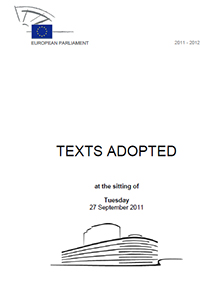 The proposal for a EU Road Safety Coordinator recommends that the position should amongst other things:
The proposal for a EU Road Safety Coordinator recommends that the position should amongst other things:
- promote – as a recognised personality in the field of road transport safety – current, and initiate innovative new, road safety projects with his experience, expertise and skills
- coordinate road safety measures within the Commission and between the Member States
Is this a “power” too far to let the European Union have a specific road Safety Tzar?
UK MEP Philip Bradbourn and Irish MEP Marian Harkin certainly think so:
“Philip Bradbourn (ECR), in writing. − The ECR Group is committed to improving safety on Europe’s roads. However, the Koch report in a large number of areas called for measures at a European level which are outside the competence of the EU. Road safety is a matter best dealt with by national and local authorities. Similarly, the ECR Group opposes the setting up of agencies, or in this case coordinators at a European level, dealing with such matters and for this reason voted against the Koch report.”
“Irish MEP Marian Harkin (ALDE), in writing. – I do not believe that an EU Road Safety Coordinator would add value at European level. I believe this would be a further layer of bureaucracy without any real benefits. Yes, I know we need exchange of best practice, but if we set up an EU Road Safety Coordinator that means we need a secretariat and this would require extra resources that I believe could be better used elsewhere.”
In a report in April on the EurActiv website Click Here Dieter-Lebrecht Koch expanded on his then vision for an EU Road Safety Coordinator.
The report says that, “The MEP hopes to establish the post of coordinator by 2014 and imagines that the official could be at the level of director-general, reporting to Commission President José Manuel Barroso. Koch envisages the creation of a whole new Directorate-General to deal with mobility and offer an overarching approach to the issue.” adding “and have the right to initiate legislation to enhance safety on European roads.”
EU – Unified Motorcycle Safety
There are many motorcycle safety initiatives in various countries across the EU these are tailored for riders in their own member states from national to local level.
Organisations, including the industry are also involved in Europe wide motorcycle safety.
Do we, as a motorcycle community across Europe want this interference in our own issues with a one size fits all and with the “benefits” of the possible needs for EU legislation derived from some of these projects?
These projects and initiatives depend on the input and acceptance of riders, many having been initiated by riders themselves, organisations or industry. Do we want edicts from the EU that dictate what safety initiatives should be implemented for motorcyclists?
There is a raft of other projects on motorcycle safety, all vying for European money and putting their views on how their “brand” of motorcycle safety will improve casualties and the safety of riders.
Yes motorcycle safety is important, yes we want to improve all aspects of motorcycle safety but the basics must be got right first.
Do we really need more from Europe, apart from hard cash without any strings attached?
Challenge to Transport and Tourism committee and European Parliament
The challenge to the Transport and Tourism committee, Dieter-Lebrecht Koch and the European Parliament which adopted this resolution and report, is simply to provide facts to back up Mr Koch’s statement.
- whereas the number of road deaths has fallen constantly but the number of fatal accidents involving motorcyclists is stagnating and in many places rising,
If there are no facts to back up the statement regarding the so called static or increased level of fatalities of motorcyclists, to find a way to provide clear and factual data on motorcycle casualties – preferably differentiating between countries that may have issues and countries (such as the UK) that do not.
We also request that Mr Koch deletes the call for the introduction of monitoring equipment by means of which speeding offences by motorcyclists can be systematically detected and punished, which singles out riders in the adopted text and report. This call is discriminatory.
- Calls for the introduction of monitoring equipment by means of which speeding offences by motorcyclists can be systematically detected and punished;
As the resolution and report has been adopted by the European Parliament then a way should be found in European Parliament procedures to delete these statements.
Further Information
For The Full Right To Ride Document – Highwaymen – EU Road Safety – pdf 969kb – Click Here
See what FEMA (Federation of European Motorcyclists Associations) say – Click Here
There are other various road safety recommendations and considerations contained in the report which would have an impact on motorcycling through general or specific road safety. However we will leave it to you to consider these and make your own mind up on they could affect you.
Texts Adopted at the sitting of European Parliament Tuesday 27 September 2011 – pdf 224kb – Click Here pdf 224kb
European Parliament Procedure File – Click Here
European Parliament adopted text – links to debates and votes – Click Here
List of Amendments 1 – 262 Draft report – European road safety 2011-2020 – pdf 368kb – Click Here
Committee on Transport and Tourism (Tran) – Click Here
European Commission Road Safety – Motorcyclists and Moped Users – Click Here
Highwaymen EU Road Safety
Why Highwaymen?
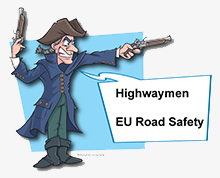 In an amendment submitted to the Transport and Tourism (Tran) committee and a speech later made in the European parliament by the Italian MEP Giommaria Uggias (ALDE) in the debate on Road Safety, Mr Uggias lamented that, “The Committee on Transport and Tourism has not been sufficiently brave and did not have the ambition to accept a full harmonization of rules relevant to road safety,” and that “The Commission has decided not to accept.
In an amendment submitted to the Transport and Tourism (Tran) committee and a speech later made in the European parliament by the Italian MEP Giommaria Uggias (ALDE) in the debate on Road Safety, Mr Uggias lamented that, “The Committee on Transport and Tourism has not been sufficiently brave and did not have the ambition to accept a full harmonization of rules relevant to road safety,” and that “The Commission has decided not to accept.
His amendment called for “Determined efforts to harmonise road signs and road traffic rules by 2013 and for the driving side of the road to be standardised in all the Member States, in view of objective safety requirements”, which means that the UK, Ireland and Malta would have to change to driving and riding on the ‘right’ side of the road!
However, historically, up to the late 1700s, everybody throughout Europe travelled on the left side of the road because it was the sensible option for feudal, violent societies of mostly right-handed people. When travellers passed each other on the road they should be in the best possible position to use their sword to protect themselves against Highwaymen, which meant keeping to the left side of the road.
That remained until 1773 in the UK when an increase in horse traffic forced the British Government to introduce the General Highways Act which contained a keep left recommendation. This became a law as part of the Highways Bill in 1835.
Revolutionary France, however, overturned this practice as part of its sweeping social rethink. A change was carried out all over continental Europe by Napoleon to keep to the right side of the road. The reason it changed under Napoleon was because he was left handed, his armies had to march on the right so he could keep his sword arm between him and any opponent.
Source: Click here
We could argue that historically, the logic of keeping to the left was a sensible choice to protect oneself and possibly the beginning of road safety, whereas the rule of keeping to the right was based purely on the delusions of grandeur of one man…..
Thankfully this amendment was rejected!


This is an excellent article. Thank you very much!